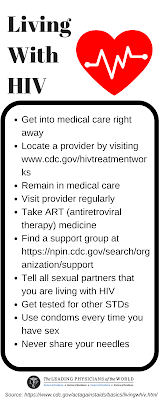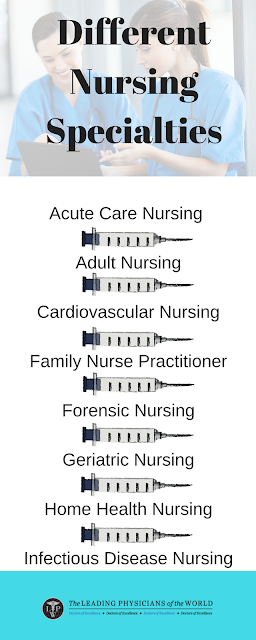Care And Support To People Living With Hiv
Today, an
estimated 1.1 million people are living with HIV in the United States. Thanks
to better treatments, people with HIV are now living longer—and with a better
quality of life—than ever before. If you are living with HIV, it’s important to
make choices that keep you healthy and protect others.
1. Stay healthy
You should start medical care and begin HIV treatment as soon as you are diagnosed with HIV. Taking medicine to treat HIV, called antiretroviral therapy or ART, is recommended for all people with HIV. Taking medicine to treat HIV slows the progression of HIV and helps protect your immune system. The medicine can keep you healthy for many years and greatly reduces your chance of transmitting HIV to sex partners if taken the right way, every day.If you’re taking medicine to treat HIV, visit your health care provider regularly and always take your medicine as directed to keep your viral load (the amount of HIV in the blood and elsewhere in the body) as low as possible.
2. Do tell
It’s important to disclose your HIV status to your sex and needle-sharing partners even if you are uncomfortable doing it. Communicating with each other about your HIV status allows you and your partner to take steps to keep both of you healthy.Many resources can help you learn ways to disclose your status to your partners.
Also, ask your health department about free partner notification services. Health department staff can help find your sex or needle-sharing partners to let them know they may have been exposed to HIV and provide them with testing, counseling, and referrals for other services. These partner notification services will not reveal your name unless you want to work with them to tell your partners.
Many states have laws that require you to tell your sexual partners if you’re HIV-positive before you have sex (anal, vaginal, or oral) or tell your needle-sharing partners before you share drugs or needles to inject drugs. In some states, you can be charged with a crime if you don’t tell your partner your HIV status, even if your partner doesn’t become infected.
3. Get support
Receiving a
diagnosis of HIV can be a life-changing event. People can feel many
emotions—sadness, hopelessness, and even anger. Allied health care providers
and social service providers, often available at your health care provider’s
office, will have the tools to help you work through the early stages of your
diagnosis and begin to manage your HIV.
Talking to others who have HIV may also be helpful. Find a local HIV support group. Learn about how other people living with HIV have handled their diagnosis.
The higher your viral load, the more likely you are to transmit HIV to others. When your viral load is very low (called viral suppression, with less than 200 copies per milliliter of blood) or undetectable (about 40 copies per milliliter of blood), your chance of transmitting HIV is greatly reduced. However, this is true only if you can stay virally suppressed. One thing that can increase viral load is not taking HIV medicines the right way, every day. You can also protect your partners by getting tested and treated for other STDs. If you have both HIV and some other STD with sores, like syphilis, your risk of transmitting HIV can be about 3 times as high as if you didn’t have any STD with sores.So, be careful and get tested!





Comments
Post a Comment